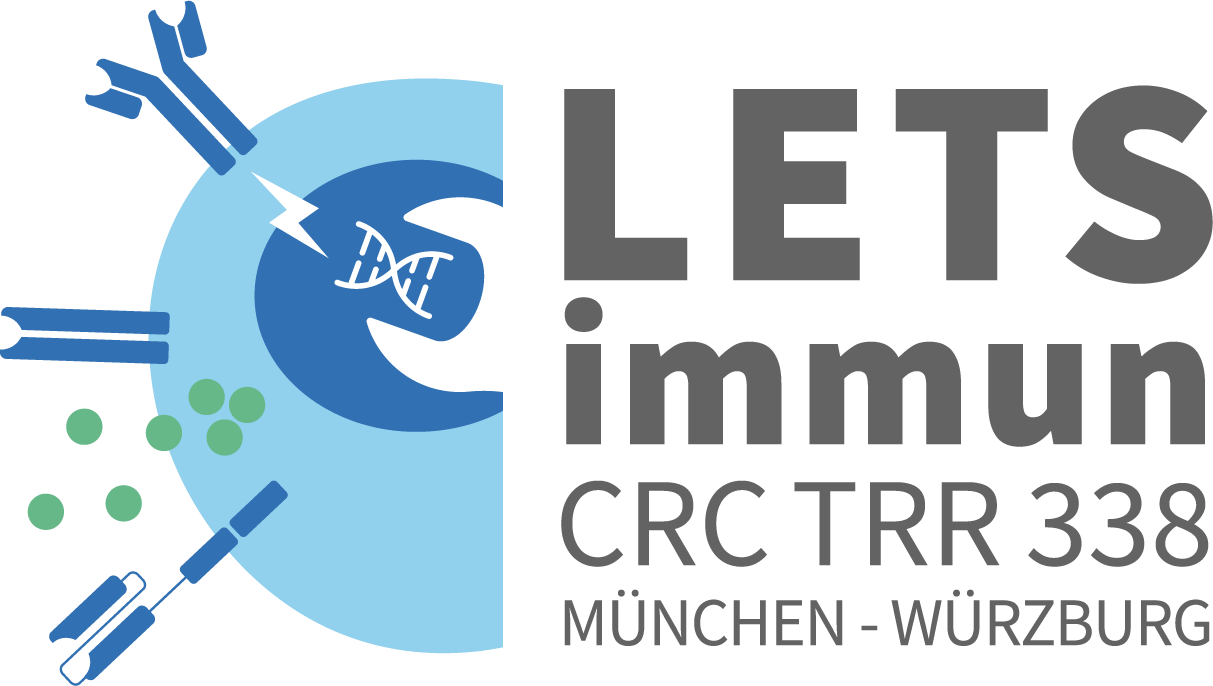
Prof. Dr. med. Marion Subklewe
Medizinische Klinik und Poliklinik III
Klinikum der Ludwig-Maximilians-Universität München
Marchioninistr. 15
81377 München
Phone: +49 (0)89 – 4400 73133
Email: marion.subklewe@med.uni-muenchen.de
University training and degree
1988 – 1993 Humanmedizin: University of Aachen and University of Cologne, including rotations at Royal North Shore Hospital (Sydney, Australia), Boston University (Boston, USA), Rambam Hospital (Haifa, Israel)
Advanced academic qualifications
2014 W2-Professor for Internal Medicine with Focus on Cellular Immunotherapy
2007 Habilitation in Internal Medicine at the Charite, Berlin, on “EBV-specific T-cells”
2007 Board Certification in Hematology / Oncology
2005 Board Certification in Internal Medicine
1996-2000 Postdoctoral Fellowship at the Laboratory of Cellular Physiology, Rockefeller University, NY, NY, USA, Head. Prof. Dr. R. Steinman (DFG Scholarship)
1996 Medical Dissertation at the University of Cologne, Department of Internal Medicine, Hematology / Oncology (Professor Dr. V. Diehl)
Postgraduate professional career
Since 2017 Head of the Laboratory for Translational Cancer Immunology
Gene Center Munich, LMU
Since 2014 Professor for Internal Medicine with focus on Cellular Immunotherapy
Medical Department III, Hematology / Oncology, Klinikum – University of Munich
since 2009 Head of Flow cytometry, Laboratory of Leukemia Diagnostics, LMU – Klinikum
since 2009 Consultant for Hematology / Oncology, Klinikum – University of Munich, Department of Medicine III, Hematology / Oncology
2008 – 2009 Clinical Fellow Hematology / Oncology, Klinikum – University of Munich,
Department of Medicine III, Hematology / Oncology
2000 – 2007 Clinical Fellow Hematology / Oncology, Charité – Campus Virchow Klinikum,
Medical Department III, Hematology / Oncology
1996 – 2000 Postdoctoral Fellow, DFG-Scholarship, Cure for Lymphoma Fellow
Rockefeller University, New York – Prof. Dr. R. M. Steinman
1995 – 1996 Residency Internal Medicine, University Hospital Tübingen, Hem / Onc
1994 – 1995 Internship Internal Medicine, University Hospital Freiburg, Hem / Onc
- Speaker of the Munich Clinician-Scientist Program, LMU, Medical Faculty;
- EKFS Clinician-Scientist Program for Cancer Immunotherapy,
- M4-Award for novel antibody derivatives,
- Project leader: SFB1243 on Cancer Evolution,
- International Graduate Programme “ImmunoTargeting of Cancer”;
- PI in > 30 phase I/II/III trials including I-ITs; Head of 2-I-ITs,
- Steering Committee AMLCG; Member of the „Senatsausschuss Graduiertenkollege“, DFG
- Organizing Committee “Acute Leukemia”; Steering Committee PERCELLUM
- Grant reviewer for DFG, Krebshilfe, Sander Stiftung, Jose-Carreras, OeGHO, Dutch Cancer Society, UK Cancer Research, Worldwide Cancer Research,
- Member of multiple Scientific Societies (EHA; ASH, DGHO)
a) Articles published by outlets with scientific quality assurance, book publications and works accepted for publication, but not yet published
1. Lichtenegger F., Schnorfeil F., Rothe M., Dieser K, Altmann T, Bücklein V, Köhnke T, Augsberger C, Konstandin N, Spiekermann K, Moosmann A., Boehm S., Boxberg M., Heemskerk M, Goerlich D, Wittmann G, Wagner B, Hiddemann W., Schendel D, Kvalheim G, Bigalke I, Subklewe M: Toll-like receptor 7/8 matured RNA_transduced dendritic cells as post-remission therapy in AML: results of a phase I trial. Clin Transl Immunology 2020; 9(3): e1117.
2. Brauchle B, Goldstein R., Karbowski C., Henn A., Chi-Ming L., Bücklein V., Krupka C., Boyle M., Koppikar P., Haubner S., Wahl J., Dahlhoff C., Raum T., Rardin M., Sastri C., Rock D., Bergwelt-Baildon M., Frank B., Metzeler K., Case R., Friedrich M., Balzs, M., Spiekermann K., Coxon A., Subklewe M., Arvedson T. (2020): Characterization of a novel FLT3 BiTE Antibody construct for the treatment of AML. Molecular Cancer Therapeutics 2020 Jun 9:molcanther.1093.2019.
3. Köhnke, T., Bücklein, V., Rechkemmer, S., Schneider, S., Rothenberg-Thurley, M., Metzeler, K.H., Sauerland, M.-C., Hiddemann, W., Spiekermann, K., and Subklewe, M. (2019). Response assessment in acute myeloid leukemia by flow cytometry supersedes cytomorphology at time of aplasia, amends cases without molecular residual disease marker and serves as an independent prognostic marker at time of aplasia and post-induction. Haematologica 104, 215236.
4. Haubner, S., Perna, F., Köhnke, T., Schmidt, C., Augsberger, C., Schnorfeil, F.M., Krupka, C., Lichtenegger, F.S., Liu, X., Kerbs, P. Schneider, S., Metzeler, K. H., Spiekermann, K., Hiddemann, W., Greif, P. A., Herold, T., Sadelain, M., and Subklewe, M. (2019). Coexpression profile of leukemic stem cell markers for combinatorial targeted therapy in AML. Leukemia 33, 64–74.
5. Braciak, T.A., Roskopf, C.C., Wildenhain, S., Fenn, N.C., Schiller, C.B., Schubert, I.A., Jacob, U., Honegger, A., Krupka, C., Subklewe, M., Spiekermann, K., Hopfner, K.P., Fey, G.H., Aigner, M., Krause, S., Mackensen, A., and Oduncu, F.S. (2018). Dual-targeting triplebody 33–16–123 (SPM–2) mediates effective redirected lysis of primary blasts from patients with a broad range of AML subtypes in combination with natural killer cells. Oncoimmunology 7, e1472195.
6. Herrmann, M., Krupka, C., Deiser, K., Brauchle, B., Marcinek, A., Ogrinc Wagner, A., Rataj, F., Mocikat, R., Metzeler, K.H., Spiekermann, K., Kobold, S., Fenn, N.C., Hopfner, K.P., and Subklewe M. (2018). Bifunctional PD-1 × αCD3 × αCD33 fusion protein reverses adaptive immune escape in acute myeloid leukemia. Blood 132, 2484–2494.
7. Lichtenegger, F.S., Rothe, M., Schnorfeil, F.M., Deiser, K., Krupka, C., Augsberger, C., Schluter, M., Neitz, J., and Subklewe, M. (2018). Targeting LAG-3 and PD-1 to Enhance T Cell Activation by Antigen- Presenting Cells. Front Immunol. 9, 385.
8. Reiter, K., Polzer, H., Krupka, C., Maiser, A., Vick, B., Rothenberg-Thurley, M., Metzeler, K.H., Dorfel, D., Salih, H.R., Jung, G., Nossner, E., Jeremias, I., Hiddemann, W., Leonhardt, H., Spiekermann, K., Subklewe, M.*, and Greif, P.A. (2018). Tyrosine kinase inhibition increases the cell surface localization of FLT3-ITD and enhances FLT3-directed immunotherapy of acute myeloid leukemia. Leukemia 32, 313–322. (*contributed equally last author)
9. Gaidt MM, Ebert TS, Chauhan D, Ramshorn K, Pinci F, Zuber S, O’Duill F, Schmid-Burgk JL, Hoss F, Buhmann R, Wittmann G, Latz E, Subklewe M, Hornung V. : The DNA Inflammasome in Human Myeloid Cells Is Initiated by a STING-Cell Death Program Upstream of NLRP3. Cell. 2017 Nov 16;171(5):1110-1124.e18.
10. Krupka, C., Kufer, P., Kischel, R., Zugmaier, G., Lichtenegger, F.S., Kohnke, T., Vick, B., Jeremias, I., Metzeler, K.H., Altmann, T., Schneider, S., Fiegl, M., Spiekermann, K., Bauerle, P. A., Hiddemann, W., Riethmuller, G., and Subklewe, M. (2016). Blockade of the PD-1/PD-L1 axis augments lysis of AML cells by the CD33/CD3 BiTE antibody construct AMG 330: reversing a T-cell-induced immune escape mechanism. Leukemia 30, 484–491.
